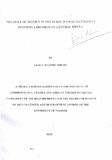| dc.description.abstract | This study sought to assess the role of women in household food security. It was conducted among women of over 18 years who are smallholding farmers of rural Mathioya Division of Central Kenya. The study aimed at examining factors that influence women's efforts in their contribution to household food security. Data was collected through structured questionnaires, observation checklist and key informants. Quantitative data was analyzed using the Statistical Package for the Social Sciences (SPSS), and the findings are presented in tables of frequencies and percentages.
The study revealed that women are key in food and animal production and they provide all the labor required. Farm and livestock products are the main resources for household food security in the study area. Income generating activities along with other possible income sources (cash crops and small vegetable groceries) provide households with income to acquire food. Women play a crucial role in all these activities.
However, women were found to be disadvantaged regarding freedom to manage and use family land. The introduction of cash crops, that is, coffee and tea, has brought about changes in land use, in the way land is controlled and how decisions are made. ln Mathioya this is based on the supremacy of the male of the household. Land scarcity for food crops, women's triple roles, lack of decision making power, and lack of extension services, were found to be a constraint in food production, thus undermining household food security.
The study also revealed that women in Mathioya apply some forms of coping strategies to mitigate household food insecurity, some of which are a threat to their overall health. In light of the above, this study recommends that the relevant institutions like the county council and the Member of Parliament enhance the implementation of the policies in place that can empower women; for example, ensuring adult education teachers are posted and their work monitored. The government should enshrine laws that will not discriminate against women in food security programmes. | en |

